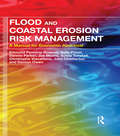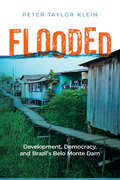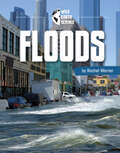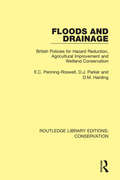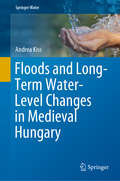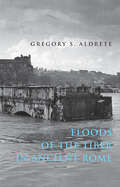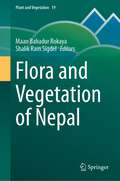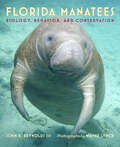- Table View
- List View
Flood and Coastal Erosion Risk Management: A Manual for Economic Appraisal
by Edmund Penning-Rowsell Sally Priest Dennis Parker Joe Morris Sylvia Tunstall Christophe Viavattene John Chatterton Damon OwenA new ‘Multi-Coloured Manual' This book is a successor to and replacement for the highly respected manual and handbook on the benefits of flood and coastal risk management, produced by the Flood Hazard Research Centre at Middlesex University, UK, with support from Defra and the Environment Agency. It builds upon a previous book known as the "multi-coloured manual" (2005), which itself was a synthesis of the blue (1977), red (1987) and yellow manuals (1992). As such it expands and updates this work, to provide a manual of assessment techniques of flood risk management benefits, indirect benefits, and coastal erosion risk management benefits. It has three key aims. First it provides methods and data which can be used for the practical assessment of schemes and policies. Secondly it describes new research to update the data and improve techniques. Thirdly it explains the limitations and complications of Benefit-Cost Analysis, to guide decision-making on investment in river and coastal risk management schemes.
Flood: Flood (Stay Alive #4)
by Joseph MonningerStranded in the middle of nowhere, you have to fight to survive!When a heavy storm causes their town to flood, a group of kids must fight to survive against the harsh elements. But the storm is just the beginning of their worries. After all the power goes out, they're going to have to scrounge to find water, food, and a dry place to stay. Who will stay alive?
Flooded: Development, Democracy, and Brazil’s Belo Monte Dam (Nature, Society, and Culture)
by Peter Taylor KleinIn the middle of the twentieth century, governments ignored the negative effects of large-scale infrastructure projects. In recent decades, many democratic countries have continued to use dams to promote growth, but have also introduced accompanying programs to alleviate these harmful consequences of dams for local people, to reduce poverty, and to promote participatory governance. This type of dam building undoubtedly represents a step forward in responsible governing. But have these policies really worked? Flooded provides insights into the little-known effects of these approaches through a close examination of Brazil’s Belo Monte hydroelectric facility. After three decades of controversy over damming the Xingu River, a tributary of the Amazon, the dam was completed in 2019 under the left-of-center Workers’ Party, becoming the world’s fourth largest. Billions of dollars for social welfare programs accompanied construction. Nonetheless, the dam brought extensive social, political, and environmental upheaval to the region. The population soared, cost of living skyrocketed, violence spiked, pollution increased, and already overextended education and healthcare systems were strained. Nearly 40,000 people were displaced and ecosystems were significantly disrupted. Klein tells the stories of dam-affected communities, including activists, social movements, non-governmental organizations, and public defenders and public prosecutors. He details how these groups, as well as government officials and representatives from private companies, negotiated the upheaval through protests, participating in public forums for deliberation, using legal mechanisms to push for protections for the most vulnerable, and engaging in myriad other civic spaces. Flooded provides a rich ethnographic account of democracy and development in the making. In the midst of today’s climate crisis, this book showcases the challenges and opportunities of meeting increasing demands for energy in equitable ways.
Floods (Wild Earth Science)
by Rachel WernerPeople, plants, and animals all need rain. But the ground can take in only so much. Too much, and the land will flood. Farms and cities can be damaged. People must move to dry ground until, slowly, the water soaks into the earth. Learn about floods, what we can do, and how to stay safe.
Floods and Drainage: British Policies for Hazard Reduction, Agricultural Improvement and Wetland Conservation (Routledge Library Editions: Conservation #5)
by E.C. Penning-Rowsell D. J. Parker D.M. HardingOriginally published in 1986, Floods and Drainage advanced hazard – response theory as developed mainly by the White/Burton/Kates school of researchers in North America. Based on fifteen years of research, the book rejects conventional theory’s emphasis on personal response to hazardous environments, suggesting that this seriously detracts from the institutional and political forces that are so important in the analysis of hazard responses and policies. The book also seeks to provide material of practical relevance to environmental managers and engineers, rather than to present just research results.
Floods and Long-Term Water-Level Changes in Medieval Hungary (Springer Water)
by Andrea KissThe book provides an overview of the floods and major hydrological changes that occurred in the medieval Hungarian kingdom (covering the majority of the Carpathian Basin) between 1000 and 1500 AD. The analysis was based on contemporary documentary evidence presented for the first time and the results of archaeological and scientific investigations. Beyond the evidence on individual flood events, the book includes a comprehensive overview of short-, medium-, and long-term changes detected in a hydrologically sensitive environment during the transition period between the Medieval Warm Period and the Little Ice Age. It also discusses the possible causes (including climate and human intervention) and the consequences for the physical and human environment, namely the related hydro-morphological changes, short- and long-term social response, and human perception issues.
Floods in a Changing Climate
by P. P. Mujumdar D. Nagesh KumarVarious modeling methodologies are available to aid planning and operational decision making: this book synthesises these, with an emphasis on methodologies applicable in data scarce regions, such as developing countries. Problems included in each chapter, and supported by links to available online data sets and modeling tools, engage the reader with practical applications of the models. Academic researchers in the fields of hydrology, climate change, and environmental science and hazards, and professionals and policy-makers working in hazard mitigation, remote sensing and hydrological engineering will find this an invaluable resource. This volume is the second in a collection of four books on flood disaster management theory and practice within the context of anthropogenic climate change. The others are: Floods in a Changing Climate: Extreme Precipitation by Ramesh Teegavarapu, Floods in a Changing Climate: Inundation Modelling by Giuliano Di Baldassarre and Floods in a Changing Climate: Risk Management by Slodoban Simonović.
Floods of the Tiber in Ancient Rome (Ancient Society and History)
by Gregory S. AldreteA study of the impact of flooding on the ancient city during the classical period.While the remains of its massive aqueducts serve as tangible reminders of Rome’s efforts to control its supply of drinking water, there are scant physical reminders that other waters sometimes raged out of control. In fact, floods were simply a part of life in ancient Rome, where proximity to the Tiber left a substantial part of the city vulnerable to the river’s occasional transgressions.Here, in the first book-length treatment of the impact of floods on an ancient city, Gregory S. Aldrete draws upon a diverse range of scientific and cultural data to develop a rich and detailed account of flooding in Rome throughout the classical period.Aldrete explores in detail the overflowing river’s destructive effects, drawing from ancient and modern written records and literary accounts, analyses of the topography and hydrology of the Tiber drainage basin, visible evidence on surviving structures, and the known engineering methods devised to limit the reach of rising water. He discusses the strategies the Romans employed to alleviate or prevent flooding, their social and religious attitudes toward floods, and how the threat of inundation influenced the development of the city’s physical and economic landscapes.“Floods of the Tiber in Ancient Rome is that rare thing in scholarship, a work that genuinely fills a gap in the scholarly literature. Professor Aldrete has brilliantly illuminated an aspect of ancient Rome that was ever present to the city’s inhabitants but almost invisible to modern historians.” —Stanley Burstein, history teacher“Raises important questions about the effects of flooding of the Tiber on the city of ancient Rome and its inhabitants and explores why Romans did not take more sweeping steps to reduce, if not eliminate, the dangers of urban flooding. There is no comparable book-length study of this topic, so this work fills a real need. It will be of interest not only to students of ancient history, but to hydrologists and students of urban studies as well. Certainly it will give us classicists much to think about in our assessment of urban life in ancient Rome.” —Harry B. Evans, Fordham University, author of Aqueduct Hunting in the Seventeenth Century
Floods: Extreme Weather (Theme Sets)
by Josie GreenExplains the causes of four different types of weather: droughts, floods, tornadoes, and hurricanes
Flora Fantastic: From Orchidelirium to Ecocritical Contemporary Art (ISSN)
by Corina L. Apostol Tashima ThomasThis book delves deep into colonial botany, utilizing mediums such as historical investigation, cinema, photography, live performance, and installation art.Surveying perspectives from Europe, the U.S., Africa, Southeast Asia, Latin America, and the Caribbean, it positions plants—both native and foreign—as active participants and silent observers in colonial narratives. By viewing through the prism of visual and performance art, this book touches on diverse topics like the economic value of plants, traditional and Western medicine, state‑endorsed scientific endeavors, migration patterns of flora and people, bio‑contact areas, nationalistic views, and botanical diplomacy. It offers fresh insights into colonial botany’s multifaceted history, emphasizing the intricate interplay between Eastern, Western, and Southern nations during the twentieth century and its enduring impact today.Serving as an invaluable addition to the realms of art history, performance studies, botany, visual culture, decolonial initiatives, and environmental politics, this book arrives at a pivotal moment when its insights are most crucial.
Flora Poetica: The Chatto Book of Botanical Verse
by Sarah MaguireThis beautiful anthology brings together over 250 poems about flowers, plants and trees from eight centuries of writing in English, creating a rich bouquet of intriguing juxtapositions. Fourteenth-century lyrics sit next to poems of the twenty-first century; celebrations of plants native to the English soil share the volume with more exotic plant poetry. There are thirty poems about roses, by poets as diverse as Shakespeare, Dorothy Parker and the South African, Seitlhamo Motsapi; but there are also sections devoted to more unusual plants such as the mandrake, the starapple and the tamarind. An ex-gardener, the celebrated poet Sarah Maguire brings her extensive horticultural knowledge to bear on all the poems, arranging them into botanical families, identifying the plants being written about and writing a fascinating introduction. Whether you are a poetry lover, a gardener, a botanist, or simply the purchaser of the occasional bunch of flowers, this unique anthology allows you to luxuriate amidst the world's flora.
Flora and Vegetation of Nepal (Plant and Vegetation #19)
by Maan Bahadur Rokaya Shalik Ram SigdelThis volume highlights the plant life of Nepal, which accounts for 20% of the Himalayan biodiversity. For the first time, this group of authors compile over 200 years’ worth of local botanical research. Due to the high topographical diversity, Nepal has a very unique flora and vegetation. The chapters focus on cryptogams, phanerogams and alien flora. As an added bonus, historical background for native and invasive species, is explained. Aside from botanical knowledge, the authors also shed a light on Nepali geography, soil, climate and land use. To complete the picture, readers will find data on different plants, maps and photographs of unique species. This book is a valuable resource for Botanists and Ecologists, but also for interested travelers who would like to complement their next trek in Nepal.
Flora of Alberta
by John G. Packer E. H. MossSince the publication of the first edition more than thirty years ago, The Flora of Alberta has become the standard guide for naturalists, botanists, and all those interested in the wildlife of the province. It provides an inventory of 1775 known vascular plant species- ferns, conifers, and flowering plants - that are native to Alberta, or if non-native, that have become established and grow wild int he province. All are grouped according to genus and family, with descriptions of species, genera, and families. Keys are provided to allow for the identification of all the known species, along with information on habitats in which species generally occur. The text for each species includes the chromosome number and indicates the geographical distribution in North America. Also included are 1158 provincial distribution maps, showing the locations of native species, and two specially prepared maps of the province - one indicating the distribution of major soil groups, the other distribution of major vegetation types. In the years since its initial publication The Flora of Alberta has been revised, updated, and considerably expanded while retaining the original format and purpose that have made it indispensable to a wide range of readers.
Floral Diagrams: An Aid to Understanding Flower Morphology and Evolution
by Louis P. Ronse De CraeneFloral morphology remains the cornerstone for plant identification and studies of plant evolution. This guide gives a global overview of the floral diversity of the angiosperms through the use of detailed floral diagrams. These schematic diagrams replace long descriptions or complicated drawings as a tool for understanding floral structure and evolution. They show important features of flowers, such as the relative positions of the different organs, their fusion, symmetry, and structural details. The relevance of the diagrams is discussed, and pertinent evolutionary trends are illustrated. The range of plant species represented reflects the most recent classification of flowering plants based mainly on molecular data, which is expected to remain stable in the future. This book is invaluable for researchers and students working on plant structure, development and systematics, as well as being an important resource for plant ecologists, evolutionary botanists and horticulturists.
Floral Ornament (Dover Pictorial Archive Ser.)
by Carol Belanger GraftonGraphic artists and craftworkers in search of attractive and unusual floral motifs will find them in this rich treasury of exquisite designs. Carol Belanger Grafton has selected over 350 handsome floral and foliated arrangements from a wide variety of Victorian-era sources. Reproduced from such rare publications as L'Art Pour Tous, The Art Journal, The Illustrated London News, Harper's Weekly, and The British Printer, these lovely images appear in a wide variety of configurations -- as decorative embellishments on a saucer and teacup, on picture frames and wall sconces, as flowing patterns that lend themselves well for use as frames and borders, and much more. These imaginative accents will not only enhance such print projects as brochures, newsletters, posters, signs, and catalog copy, they'll also serve as a source of inspiration to anyone working in the arts and crafts.
Florapedia: A Brief Compendium of Floral Lore (Pedia Books)
by Carol GracieA delightful illustrated treasury of botanical facts and fancyFlorapedia is an eclectic A–Z compendium of botanical lore. With more than 100 enticing entries—on topics ranging from achlorophyllous plants that use a fungus as an intermediary to obtain nutrients from other plants to zygomorphic flowers that admit only the most select pollinators—this collection is a captivating journey into the realm of botany.Writing in her incomparably engaging style, Carol Gracie discusses remarkable plants from around the globe, botanical art and artists, early botanical explorers, ethnobotanical uses of plants, botanical classification and terminology, the role of plants in history, and more. She shares illuminating facts about van Gogh's sunflowers and reveals how a hallucinogenic weed left its enduring mark on the early history of the Jamestown colony. Gracie describes the travels of John and William Bartram—father and son botanists and explorers who roamed widely in early America in search of plants—and delves into the miniature ecosystems entangled in Spanish moss. The book's convenient size allows for it to be tucked into a pocket or bag, making it the perfect companion on your own travels.With charming drawings by Amy Jean Porter, Florapedia is the ideal gift book for the plant enthusiast in your life and a rare pleasure for anyone interested in botanical art, history, medicine, or exploration.
Florencewalks
by Anne HollerMuch of Florence's art is not in her world-famous museums but in her streets, and those treasures can only be seen by those who explore this lovely, medieval city on foot. The four intimate walking tours in Florencewalks lead you through centuries of Italian history and architecture--around corners that hide marble gods and goddesses, down hushed alleys pervaded by the aroma of spices and pastas, out onto sun-washed piazzas flanked by churches and palazzos and open-air markets. Easily completed in a morning of afternoon, each walk includes plenty of spots along the way to sit and read, rest, or browse. In addition to maps of each walk, and more than thirty photographs, Florencewalks also contains a detailed section of visitor information and advice, a concise chronology of the city's history, an index, and a list of particularly special trattorias, wine bars, and shops.
Florette
by Anna WalkerWhen Mae’s family moves to a new home, she wishes she could bring her garden with her. She’ll miss the apple trees, the daffodils, and chasing butterflies in the wavy grass. But there’s no room for a garden in the city. Or is there? Mae’s story, gorgeously illustrated in watercolor, is a celebration of friendship, resilience in the face of change, and the magic of the natural world.
Florian
by Felix Salten Michel Kraike Erich PosseltA Lipizzan horse bonds with his loyal friends in this collectible edition of a classic animal tale from the author of Bambi.No one can resist Florian's charm. A pure white Lipizzan horse with perfect instincts, he has no trouble getting the attention of everyone who sees him. His two friends, Anton, the loyal and loving stable worker, and Bosco, the energetic and comical fox terrier, accompany him throughout his life. Together, the trio sees a changing world in the years leading up to World War I, and their friendship is as rewarding as their adventures.Felix Salten's story of a beautiful, Lipizzan horse and his extraordinary life is vividly depicted in this beautiful repackage.
Florida Animals for Everyday Naturalists
by Larry AllanDid you know fawns have no scent, an evolutionary defense against predators? And that the eastern grey squirrel is a formidable swimmer, which makes them quite suited for the Sunshine State? And that, unlike other avians, Florida scrub jay families stay together for years, with older siblings helping to feed younger siblings?Florida Animals for Everyday Naturalists contains everything you want to know about Florida’s furry, feathered, scaled, and shelled friends. With lively personal essays and stunning photographs, Larry Allan introduces you to the array of wildlife you might encounter in your backyard, at the park, or on a jaunt at one of the state’s many wildlife refuges. Each chapter is dedicated to a specific animal, like the bobcat, the river otter, and the caracara, and paired with vivid photos to help you identify these creatures in the wild.Allan’s fascination with Florida fauna is contagious, and his reverence of nature is unmistakable. While sharing his whimsical, enlightening, and instructive anecdotes, he gently argues for wildlife preservation in Florida and for responsible human-animal interactions.Perfect for young naturalists, inquisitive trekkers through the Sunshine State, or armchair adventurers, this book will help you appreciate the abundance of life right outside your door.
Florida Birds: A Birdwatcher Discovers the Sunshine State
by Ken JanesWading birds, raptors, waterfowl, pelicans, gulls & terns, shorebirds, and songbirds. These are the types of birds Florida birdwatchers can see and learn about in Ken Janes&’ stunning photobook Florida Birds: A Birdwatcher Discovers the Sunshine State. With all original photography by Janes and informational sections for each bird listed, those interested in the year-long hobby of Florida birdwatching will be able to not only learn key facts from this book but also display it in their homes as a piece of photo art.Birdwatching and other birding activities are seasonal in most parts of the country but can take place year-round in Florida because of the warmer climate. Janes, a Mainer until winter when he travels to his Florida home, shows northerners and southerners alike what unique aviary life can be found in the Sunshine State. Janes takes a conservationist approach to his work and makes it clear to readers how certain species of birds have been negatively affected by harmful practices and chemicals, like the effect of DDT on Osprey.
Florida Manatees: Biology, Behavior, and Conservation
by John E. Reynolds IIIA photographic journey into the secret world of Florida’s beloved manatee.Winner of the CHOICE Outstanding Academic Title of the Choice ACRLManatees, the gentle giants of Florida's lagoons and coastal habitats, can bring a smile to the face of anybody lucky enough to spy one. As manatees dip and roll through the water, crowds gather to watch them feed on aquatic vegetation. Whether they are congregating by the hundreds or resting or feeding alone, viewing these sea cows can provide anyone interested in nature with hours of tranquil pleasure.Having survived for eons, today's manatees are now under constant threat due to our rapidly swelling human population. Their habitats are often devastated by development and pollution. The slow-moving manatees also live at the mercy of chance, for they occupy waters filled with fast-moving boats powered by razor-sharp propellers—a new form of predator from which they have no protection. Boat speed limits have been put in place to protect manatees, but there is a constant push to lift them so that people can once again zip across the waters that manatees call home. For this reason, manatees are often a subject of controversy that pits their lives against the rights of boat owners. In this book, manatee expert John E. Reynolds III and famed photographer Wayne Lynch join forces to reveal the clearest portrait of manatees ever published. Florida Manatees is a song for the manatee, a celebration of the lives of these majestic creatures. Reynolds's concise, informative text shares what scientists know about manatees, while Lynch's beautiful photographs instantly demonstrate how special these "potatoes with whiskers" really are. By encouraging an appreciation of manatees, the authors hope to help ensure a future in which Floridians can find ways to coexist with and continue to enjoy these uniquely wonderful sirenian inhabitants of their state.Included in this book: How manatees first came to Florida waters How manatees fit into the ecosystems of Florida What and how much manatees eat How manatees behave and communicate with one another Why manatees look the way they do Why manatees have whiskers How manatee mothers feed their young and much more
Florida Manatees: Biology, Behavior, and Conservation
by John E. Reynolds IIIA photographic guide that “focuses on the beauty, grace and vulnerability of these herbivores, but it also covers other sea mammals and their habitats” (The Biologist).Named a Choice Outstanding Academic TitleIn this book, manatee expert John E. Reynolds III and famed photographer Wayne Lynch join forces to reveal the clearest portrait of manatees ever published. Florida Manatees is a song for the manatee, a celebration of the lives of these majestic creatures. Reynolds’s concise, informative text shares what scientists know about manatees, while Lynch’s beautiful photographs instantly demonstrate how special these “potatoes with whiskers” really are. By encouraging an appreciation of manatees, the authors hope to help ensure a future in which Floridians can find ways to coexist with and continue to enjoy these uniquely wonderful sirenian inhabitants of their state.Included in this book:How manatees first came to Florida watersHow manatees fit into the ecosystems of FloridaWhat and how much manatees eatHow manatees behave and communicate with one anotherWhy manatees look the way they doWhy manatees have whiskersHow manatee mothers feed their young and much more“A lovely book that sounds as though it would appeal primarily to scientists, but which offers inviting color photos and history that make it accessible to lay audiences both within Florida and outside the state.” —Donovan’s Literary Services
Florida Natural Springs: A History
by Holly SprinkleAuthor Holly Sprinkle unveils the secrets hidden within Florida's aquatic wonders. Florida's springs swirl a spectrum of greens and blues with a crystal clarity seen nowhere else in the world. "Springhunting" is a cherished regional pastime, but these ancient oases have served as a beacon for humans and beasts alike since time immemorial. Giant sloths, mammoths and armadillos once centered their lives around these springs--the endangered West Indian Manatee still seeks refuge in the relatively warm springs during the winter months. These enchanting waters sustain ecosystems and inspire everything from feelings of deep serenity to legends involving curses, ghosts and alien visitation.
Florida Scrub-Jay: Field Notes on a Vanishing Bird
by Mark Jerome WaltersA portrait of a species on the brink The only bird species that lives exclusively in Florida, the Florida scrub-jay was once common across the peninsula. But as development over the last 100 years reduced the habitat on which the bird depends from 39 counties to three, the species became endangered. With a writer’s eye and an explorer’s spirit, Mark Walters travels the state to report on the natural history and current predicament of Florida’s flagship bird.Tracing the millions of years of evolution and migration that led to the development of songbirds and this unique species of jay, Walters describes the Florida bird’s long, graceful tail, its hues that blend from one to the next, and its notoriously friendly manner. He then focuses on the massive land-reclamation and canal-building projects of the twentieth century that ate away at the ancient oak scrub heartlands where the bird was abundant, reducing its population by 90 percent.Walters also investigates conservation efforts taking place today. On a series of field excursions, he introduces the people who are leading the charge to save the bird from extinction—those who gather for annual counts of the species in fragmented and overlooked areas of scrub; those who relocate populations of scrub-jays out of harm’s way; those who survey and purchase land to create wildlife refuges; and those who advocate for the prescribed fires that keep scrub ecosystems inhabitable for the species.A loving portrayal of a very special bird, Florida Scrub-Jay is also a thoughtful reflection on the ethical and emotional weight of protecting a species in an age of catastrophe. Now is the time to act, says Walters, or we will lose the scrub-jay forever.
